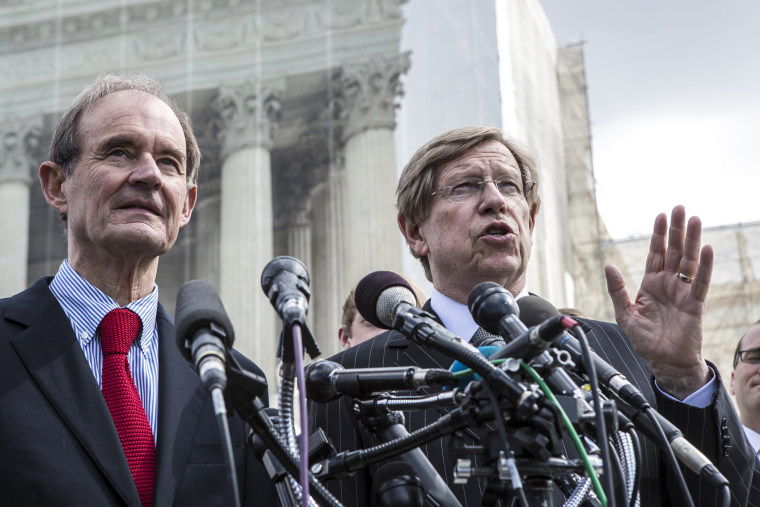AUSTIN, Texas — Democrat David Boies and Republican Ted Olson were famously on opposite sides during Bush v. Gore, the Supreme Court battle over counting 2,000 election ballots in Florida, but now, the unlikely duo is teaming up to fight for same-sex marriage rights. Their legal campaign challenging Proposition 8, the 2008 California ballot initiative banning same-sex marriage in the state, was ultimately successful when the Supreme Court refused to reinstate the ban after it was struck down.
Just before a panel at the Civil Rights Summit at the Lyndon Baines Johnson Presidential Library in Austin, msnbc caught up with Boies and Olson, who shared some of their thoughts on same-sex marriage, the conservative campaign for "religious freedom" laws, and the resignation of former Mozilla CEO Brendan Eich over his donation to the pro-Proposition 8 campaign.
What do you think about the recent court rulings in favor of same-sex marriage?
Boies: I think it's great. I haven't seen a major issue command this amount of change and this degree of universality. Every single federal judge to consider this issue since June has decided in one way, and that is in favor of marriage equality. Every single federal judge to consider the broader issues of gay and lesbian rights since June has decided in one way, and that's in favor of equal rights. That's a powerful statement, and I think Ted and I are extremely happy with it.
Did you expect these kinds of rulings in the aftermath of last year's Supreme Court decisions?
Olson: We hoped that this was exactly what the result would be. We felt right from the beginning that it was very very important for a victory in court to be accompanied by a victory in the court of public opinion. We did everything we possibly could to influence public opinion, because we wanted everybody in America to believe that when equal rights were given to gay and lesbian citizens by the Supreme Court with respect to marriage, the American people would rise up and say yes, that's right, it's about time. Because every federal judge that's considered it since then has come to the same conclusion, there's no backlash, or anything like that, in fact the American people come to the conclusion and express the conclusion publicly that this is the right answer, it's about time.
What do you make of all these state bills seeking to reject services to same-sex couples on religious grounds?
Boies: From a personal standpoint, when you are engaged in business, you have to respect people's equality and ought not to be able to discriminate. I think that's true whether you're discriminating on the basis of race, religion, sexual orientation, or any other characteristic. We've long passed the period of separate lunch counters for African-Americans, and I don't think we ought to go back to that kind of segregation in business. I think that's quite different from when you're dealing with religious issues. I think individual religions and churches are entitled to have whatever beliefs that they have, to marry or not marry whoever is consistent with those beliefs. But I think that when you're talking about business you're talking about commerce, we're on the 50th anniversary of the 1964 Civil Rights Act. One of the principles of that act is when you're engaged in commerce, you can't discriminate.
Olson: I agree absolutely with everything David said. If you're a caterer, if you're running a hotel, if you're a florist, whatever, if you're engaged in commerce you have to treat our citizens equally; that's the law.
What do you think of Mozilla CEO Brendan Eich resigning over his donation to the pro-Proposition 8 campaign?
Olson: I think that it's unfortunate, but it had something to do with that company, and the employees of that company, and their customers, and contractors and things of that nature. The fact that that individual contributed to the pro-Proposition 8 campaign six years ago, something like that, lots of people held those views at that particular time. The president was opposed to same-sex marriage at that point in time. What matters now is what's in your heart today, and he shouldn't have had to resign but I think that was internal to the company and there are probably issues there that we just don't know anything about.
Boies: I agree with that.
Do you expect the Supreme Court to revisit the issue of same-sex marriage soon? What do you think will happen?
Boies: Both Ted and I think that when it goes back to the Supreme Court, we'll win. I think that's consistent with what the federal judges have already done in the lower courts. But predicting what case they'll take, when they'll take it, that's above my pay grade.
Got questions? Ask away: Jim Brown and Ted Olson are taking your questions
